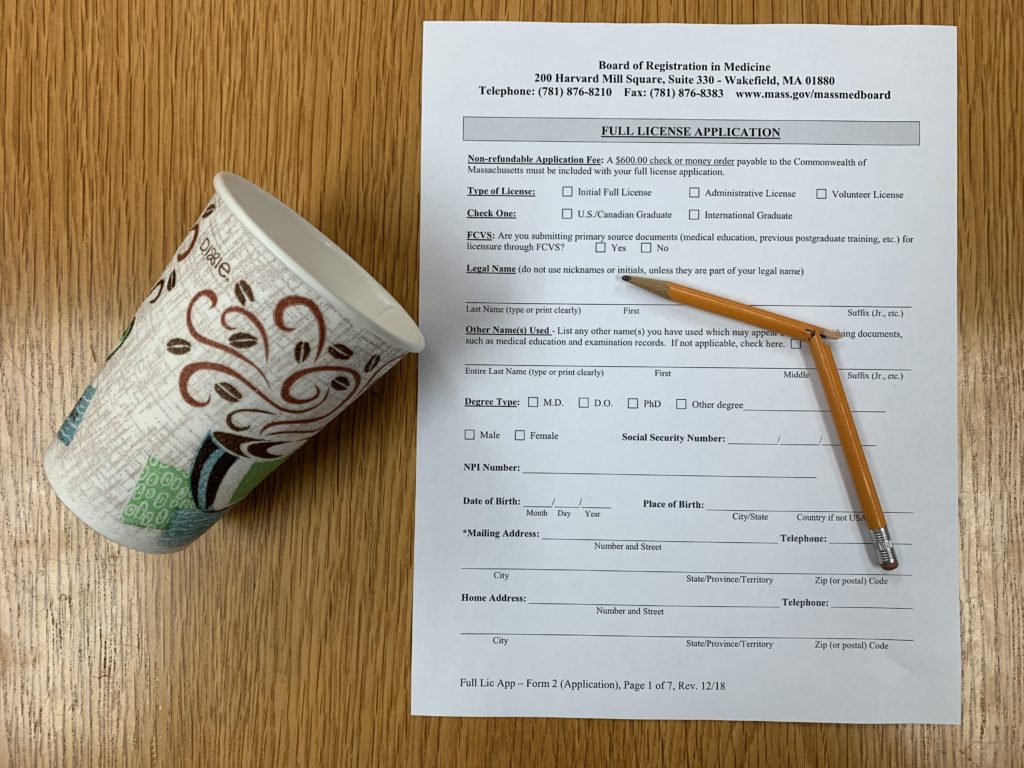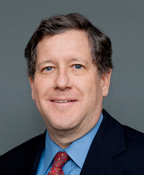The Board of Registration in Medicine has released its December 2018 license application revision. While the application is better-organized with clearer instructions, there are significant substantive changes with a common theme: the Board wants more information about you. Here are the highlights:

Disclose investigations that exonerated you. “Supplement” Question 7 has a broad new line of inquiry. The old application asked if “you ever were the subject of any disciplinary action” while in post-graduate training. Now the Board also wants to know if you were ever “under investigation.” If falsely accused, investigated and exonerated, you still must tell the Board about it. The instructions warn that, even if the false accusation is subject to a confidentiality agreement, the confidentiality agreement does not apply to the Board. Be aware of some consequences:
- Your “Yes” answer triggers a substantiation requirement: you must provide a “detailed written description” of what happened and also provide “all official documentation related to the underlying occurrence or action.”
- Even if there is no mention of the investigation in your post-graduate training record, there will now be a record of it in your Massachusetts license application. In addition, since hospitals are required to obtain your medical license application to credential you, the record of the investigation will also be in the hospital file.
- The Board’s directive that you violate a confidentiality agreement is a red flag that, if nothing else, should prompt you to get legal advice. If the confidentiality agreement is pursuant to federal law or a court order, the Board’s instruction might violate the U.S. Constitution’s Supremacy or Full Faith & Credit Clauses.
More open-ended questions about “training requirements.”While the Board’s old application asked about post-graduate training “discipline,” and also had questions about non-disciplinary “probation” and “remediation,” the new application goes even further by asking, “Were any limitations or special requirements imposed on you because of questions of competency or disciplinary problems?” There are two immediate problems with this question:
- The new question will create a new, large cohort of applicants providing “Yes” answers on their Supplement. You must report any “special requirement,” even if it never rose to the level of probation or remediation. If the program placed you in a special study group for the in-service exam, the Board may think this is a “special requirement” triggering a “Yes.” You need to think very carefully about whether you were assigned extra work, extra study or anything that might be interpreted to be a “special requirement.”
- The second problem with the “special requirement” question is that you might have received no due process, or indeed any process at all. By the time the MA Board is questioning you about what happened, it is too late for you to effectively challenge the negative narrative.
Broader definition of “current impairment.” The Board also made a significant change in its “Confidential Information” questions about physical and mental health. Both the old and the new applications ask about medical and physical conditions that “currently impair” the ability to practice medicine. The old application used a subjective definition of “current”: “recently enough to impact one’s functioning as a physician.” The new application adds the objective measure “or within the last two years.”
The addition of the phrase “within the last two years” triggers many new legal questions. The definition of “current” is part of the instructions for answering the three “confidential information” questions, numbers 29, 30 and 31.
- 29. Do you have a medical or physical condition that currently impairs your ability to practice medicine?
- 30. Have you engaged in the use of any substance(s) with the result that your ability to practice medicine is currently impaired?
- 31. Have you ever refused to submit to a test to determine whether you had consumed and/or were under the influence of chemical substances?
There is no universal legal advice for how to answer these questions. If you have had an impairment at any time, outside of the two-year look-back, within the two-year look-back, very recently or even today, multiple red flags should be waving at you. The legal problems include:
- Questions 29 and 30 seem to approach the “currently impaired” question differently. Question 29 is in the present tense (“Do you have” while Question 30 is in the present perfect tense (“Have you engaged”).
- Where does the Americans with Disabilities Act come in, and are we even dealing with a protected disability?
- What about chronic conditions? Does ADHD diagnosed when you were 14 produce an application answer different from ADHD diagnosed a year ago? (And does ADHD need to be disclosed at all?)
Finally, More Bad News…
The application process is taking longer. The old instructions estimated processing times of 10 weeks (applicants starting August to December) and 12 weeks (January to July). The new instructions increase those estimates to 12 weeks and 14 weeks, respectively. Note as well: the 12 and 14 week clocks do not start running until the Board has all paperwork from all sources, and these estimates apply only if you answered “No” to all of the “any-problem-type” questions.
About Attorney Andrew Hyams

Andrew L. Hyams specializes in representing physicians and other health professionals in licensing and disciplinary matters before their respective regulatory boards. He served as the General Counsel at the Massachusetts Board of Registration in Medicine for five years. Andy has also been Deputy General Counsel at the Boston Public Health Commission. He is admitted to practice in Massachusetts and New York.
Andy can be reached at ahyams@kcl-law.com or 781-997-1566.
